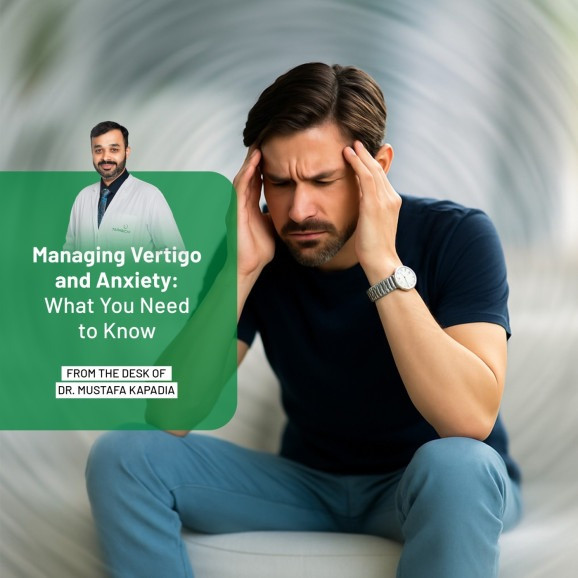Managing Vertigo and Anxiety: What You Need to Know
Contact Us
Do you often feel like the world is spinning beneath your feet? Or perhaps you find yourself overwhelmed by anxious thoughts that don’t seem to go away. If so, you might be experiencing both vertigo and anxiety, two conditions that frequently occur together and can seriously affect your daily life. Understanding how these two are connected is the first step toward managing your symptoms and regaining your balance and peace of mind.
At Tarabichi ENT, recognized among Dubai’s leading ENT specialists, we provide expert care for vertigo and related conditions. This blog will walk you through what vertigo and anxiety are, why they often overlap, and the most effective ways to manage both.
What is Vertigo?
Vertigo is a specific form of dizziness characterized by the sensation that you or your surroundings are spinning or moving, even though you remain still. Unlike general dizziness, which may feel like lightheadedness or imbalance, vertigo produces a distinct illusion of motion.
The duration of vertigo can vary widely. For some, it lasts just a few seconds or minutes. For others, it can continue for several hours or even days. In more severe cases, vertigo may persist intermittently for weeks or months, making normal daily activities challenging.
Living with vertigo can be daunting, as episodes may strike without warning, leaving you feeling unsteady and disoriented. This unpredictability often leads to stress and worry about when the next attack might occur which can, in turn, aggravate symptoms.
What Causes Vertigo?
Vertigo is typically caused by problems within the inner ear, which is essential for maintaining balance and spatial orientation. The inner ear sends important signals to the brain about the position and movement of your head. When these signals become disrupted, vertigo can result.
Here are the most common causes:
Benign Paroxysmal Positional Vertigo (BPPV)
BPPV is the most frequent cause of vertigo. It happens when tiny calcium crystals called canaliths become dislodged from their usual place in the inner ear and move into the semicircular canals. This disrupts the fluid movement that helps your brain sense head motion, leading to brief but intense spinning sensations, especially when you change head position.
Labyrinthitis
Labyrinthitis is inflammation of the labyrinth, the inner ear structure responsible for both hearing and balance. This condition typically follows a viral infection and results in prolonged vertigo episodes, often accompanied by hearing loss and tinnitus (ringing in the ears).
Vestibular Neuritis
This condition involves inflammation of the vestibular nerve, which carries balance information from the inner ear to the brain. The inflammation disrupts these signals, causing sudden and severe vertigo that may last days.
Meniere’s Disease
Meniere’s disease is a chronic disorder characterized by fluid buildup in the inner ear, causing pressure changes that lead to episodic vertigo, fluctuating hearing loss, tinnitus, and a feeling of fullness in the ear.
Other Possible Causes
Additional factors that may trigger vertigo include diabetes, stroke, head or neck injuries, low blood pressure, migraines, and the side effects of certain medications such as cardiovascular drugs, antibiotics, and anti-inflammatory medicines.
If you experience frequent or severe vertigo, consulting the best ear doctor in Dubai at Tarabichi ENT is essential. Accurate diagnosis and effective treatment can drastically improve your quality of life.
Symptoms of Vertigo
The primary symptom of vertigo is the sensation that you or your environment is spinning or moving. However, vertigo often comes with other uncomfortable symptoms such as:
- Nausea and vomiting
- Excessive sweating
- Headaches
- Ringing in the ears (tinnitus)
- Abnormal eye movements (nystagmus)
- Hearing loss or muffled hearing
- A feeling of imbalance or being pulled to one side
These symptoms can make it difficult to perform everyday tasks safely. Early recognition and treatment can prevent falls and other injuries related to loss of balance.
What is Anxiety?
Anxiety is a natural response to stress or perceived danger. It is characterized by feelings of fear, worry, and unease that prepare the body to face a threat. Physical symptoms often accompany anxiety, including:
- Rapid heartbeat (palpitations)
- Sweating
- Muscle tension, especially in the shoulders and neck
- Restlessness or an inability to relax
- Difficulty concentrating or “racing” thoughts
While occasional anxiety is normal and even helpful, chronic or excessive anxiety can interfere with daily life and contribute to other health problems, including those related to balance and dizziness.
How Are Vertigo and Anxiety Connected?
Vertigo and anxiety often occur together and can influence one another in several ways:
Adrenaline Rush
During an anxiety attack, your body releases adrenaline as part of the “fight or flight” response. This hormone increases your heart rate, speeds up breathing, and raises blood pressure. While these changes help in emergencies, they can worsen vertigo by affecting blood flow and the inner ear’s delicate balance system.
Muscle Tension
Anxiety frequently causes muscle tension, particularly in the neck, shoulders, and jaw. Tight muscles in the neck can restrict blood flow to the brain and inner ear, which may trigger or worsen vertigo symptoms.
Hyperventilation
Anxiety can cause rapid, shallow breathing called hyperventilation. This lowers carbon dioxide levels in your blood, causing blood vessels to constrict. Reduced blood flow to the brain results in dizziness and lightheadedness, which can amplify vertigo sensations.
The Vicious Cycle of Vertigo and Anxiety
Living with vertigo can be frightening. Imagine you are running errands when suddenly, the room begins to spin uncontrollably. You may feel nauseous, unsteady, and fearful. This frightening experience can trigger anxiety about when the next attack might strike.
The anxiety and worry then increase your chances of experiencing vertigo again, creating a self-perpetuating cycle. Without proper management, this cycle can significantly impact your physical and emotional health.
Recognizing the connection between vertigo and anxiety is crucial for breaking this cycle and restoring your quality of life.
Effective Ways to Manage Vertigo and Anxiety
At Tarabichi ENT, Dubai’s trusted vertigo doctor, we recommend a comprehensive approach that addresses both vertigo and anxiety together:
- Meditation and Mindfulness: Practicing meditation or mindfulness can reduce stress hormones and calm your nervous system, lowering anxiety levels that might trigger vertigo.
- Light Physical Activity: Gentle exercises like walking, swimming, or yoga help improve circulation and balance, reducing vertigo frequency and severity.
- Stay Hydrated: Proper hydration is essential for inner ear function and overall health.
- Seek Expert Care: Early diagnosis and treatment by the best ENT specialist in Dubai can address underlying causes of vertigo.
- Maintain a Balanced Diet: Eating well supports your body’s ability to cope with stress and maintain inner ear health.
- Listening to Calming Music: This can help soothe anxiety and promote relaxation.
- Cognitive Behavioral Therapy (CBT): CBT is an effective psychological treatment for anxiety, helping patients develop coping mechanisms that may also reduce vertigo symptoms.
- Adequate Sleep: Quality sleep helps the brain and body repair and reduces susceptibility to anxiety and vertigo.
- Rest During Episodes: Safely sitting or lying down during vertigo attacks can prevent injury and ease symptoms.
- Limit Tobacco, Alcohol, and Caffeine: These substances can exacerbate both vertigo and anxiety.
- Move Slowly: Avoid rapid or sudden head movements during episodes to minimize vertigo triggers.
Why Choose Tarabichi ENT for Vertigo Treatment in Dubai?
Tarabichi ENT is proud to be recognized as one of best ENT clinic in Dubai, offering specialized care for patients suffering from vertigo and anxiety. Our experienced team of ENT surgeons and audiologists use advanced diagnostic tools to identify the precise cause of your symptoms.
Our personalized treatment plans may include medication, vestibular rehabilitation therapy, or psychological support to address anxiety, ensuring a holistic approach to recovery.
With our expertise, compassionate care, and patient-centered approach, we aim to help you regain your balance both physically and emotionally.
Take Control of Your Health Today
Vertigo and anxiety can create a challenging cycle, but with the right support and treatment, you can manage your symptoms effectively. Understanding the link between these conditions is the first step toward finding relief.
If you are struggling with recurring vertigo or anxiety related to balance problems, don’t hesitate to reach out to Tarabichi ENT.
Our team of the Best ENT doctors in Dubai, at Tarabichi Healthcare is committed to delivering world-class care with precision and compassion.
Meet our dedicated specialists: Dr. Muaaz Tarabichi, Dr. Michael Timms, Dr. Mustafa Kapadia, Dr. Satish Jain, Dr. Shailesh Khode, Dr. Baher Ashour and Dr. Jamal Kassouma.
We provide minimally invasive treatments tailored to your condition, with a strong focus on safety, accuracy, and long-term results.
For Consultations and Appointments, reach out to us at




